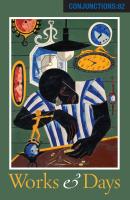Contributor History
- Milk, Conjunctions:75
- Lidded, Online 11-30-2022
Biography

Clare Beams’s novel, The Illness Lesson (Doubleday), was a New York Times Editor’s Choice and was longlisted for the Center for Fiction First Novel Prize; her story collection, We Show What We Have Learned (Lookout Books), won the Bard Fiction Prize and was a finalist for the New York Public Library’s Young Lions Fiction Award and the PEN/Robert W. Bingham Prize. Her new novel will be published by Doubleday in 2024. She lives in Pittsburgh and teaches at the Randolph MFA program.
